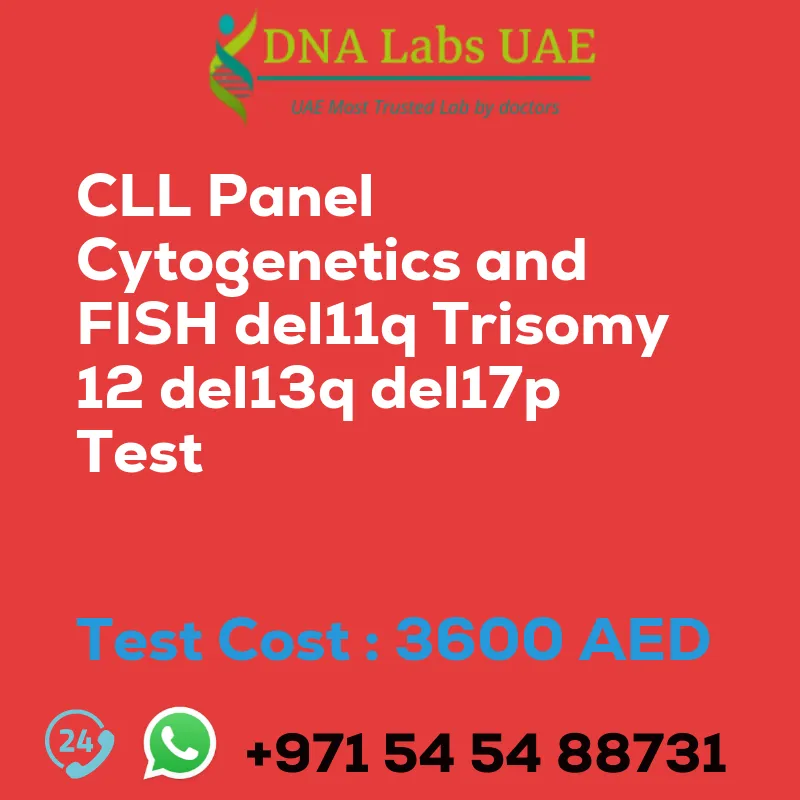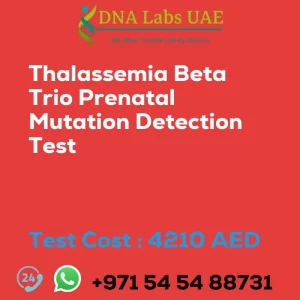CLL PANEL Cytogenetics and FISH del11q trisomy 12 del13q del17p Test
Test Name: CLL PANEL Cytogenetics and FISH del11q trisomy 12 del13q del17p Test
Components: Sodium Heparin Vacutainer (2ml)
Price: 3600.0 AED
Sample Condition: Bone marrow / Peripheral blood (Transport immediately)
Report Delivery: 5-7 days
Method: Cell Culture + FISH
Test Type: Genetics
Doctor: Gynecologist
Test Department: Pre Test Information
CLL PANEL (Cytogenetics + FISH del(11q), trisomy 12, del(13q), del(17p)]) can be done with a Doctor’s prescription. Prescription is not applicable for surgery and pregnancy cases or people planning to travel abroad.
Test Details
The CLL panel is a diagnostic test used to detect specific genetic abnormalities in patients with chronic lymphocytic leukemia (CLL). It combines cytogenetic analysis and fluorescence in situ hybridization (FISH) to identify four common genetic abnormalities associated with CLL:
- del(11q): This refers to the deletion of a portion of chromosome 11. It is associated with a more aggressive form of CLL and is often associated with a poor prognosis.
- trisomy 12: Trisomy 12 refers to the presence of an extra copy of chromosome 12. It is one of the most common genetic abnormalities in CLL and is associated with a more indolent (slow-growing) form of the disease.
- del(13q): This refers to the deletion of a portion of chromosome 13. It is the most common genetic abnormality in CLL and is generally associated with a more favorable prognosis.
- del(17p): This refers to the deletion of a portion of chromosome 17, specifically the region containing the TP53 gene. This genetic abnormality is associated with a very poor prognosis and resistance to certain treatments.
The CLL panel is performed on a sample of the patient’s blood or bone marrow. Cytogenetic analysis involves examining the chromosomes under a microscope to detect large-scale abnormalities such as deletions or trisomies. FISH is a molecular technique that uses fluorescently labeled probes to specifically target and detect the presence or absence of specific genetic abnormalities.
By identifying these genetic abnormalities, the CLL panel can help guide treatment decisions and provide prognostic information for patients with CLL.
| Test Name | CLL PANEL Cytogenetics and FISH del11q trisomy 12 del13q del17p Test |
|---|---|
| Components | Sodium Heparin Vacutainer (2ml) |
| Price | 3600.0 AED |
| Sample Condition | Bone marrow \/ Peripheral blood (Transport immediately) |
| Report Delivery | 5-7 days |
| Method | Cell Culture + FISH |
| Test type | Genetics |
| Doctor | Gynecologist |
| Test Department: | |
| Pre Test Information | CLL PANEL (Cytogenetics + FISH del(11q), trisomy 12, del(13q), del(17p)]) can be done with a Doctors prescription. Prescription is not applicable for surgery and pregnancy cases or people planing to travel abroad. |
| Test Details |
The CLL panel is a diagnostic test used to detect specific genetic abnormalities in patients with chronic lymphocytic leukemia (CLL). It combines cytogenetic analysis and fluorescence in situ hybridization (FISH) to identify four common genetic abnormalities associated with CLL. 1. del(11q): This refers to the deletion of a portion of chromosome 11. It is associated with a more aggressive form of CLL and is often associated with a poor prognosis. 2. trisomy 12: Trisomy 12 refers to the presence of an extra copy of chromosome 12. It is one of the most common genetic abnormalities in CLL and is associated with a more indolent (slow-growing) form of the disease. 3. del(13q): This refers to the deletion of a portion of chromosome 13. It is the most common genetic abnormality in CLL and is generally associated with a more favorable prognosis. 4. del(17p): This refers to the deletion of a portion of chromosome 17, specifically the region containing the TP53 gene. This genetic abnormality is associated with a very poor prognosis and resistance to certain treatments. The CLL panel is performed on a sample of the patient’s blood or bone marrow. Cytogenetic analysis involves examining the chromosomes under a microscope to detect large-scale abnormalities such as deletions or trisomies. FISH is a molecular technique that uses fluorescently labeled probes to specifically target and detect the presence or absence of specific genetic abnormalities. By identifying these genetic abnormalities, the CLL panel can help guide treatment decisions and provide prognostic information for patients with CLL. |








